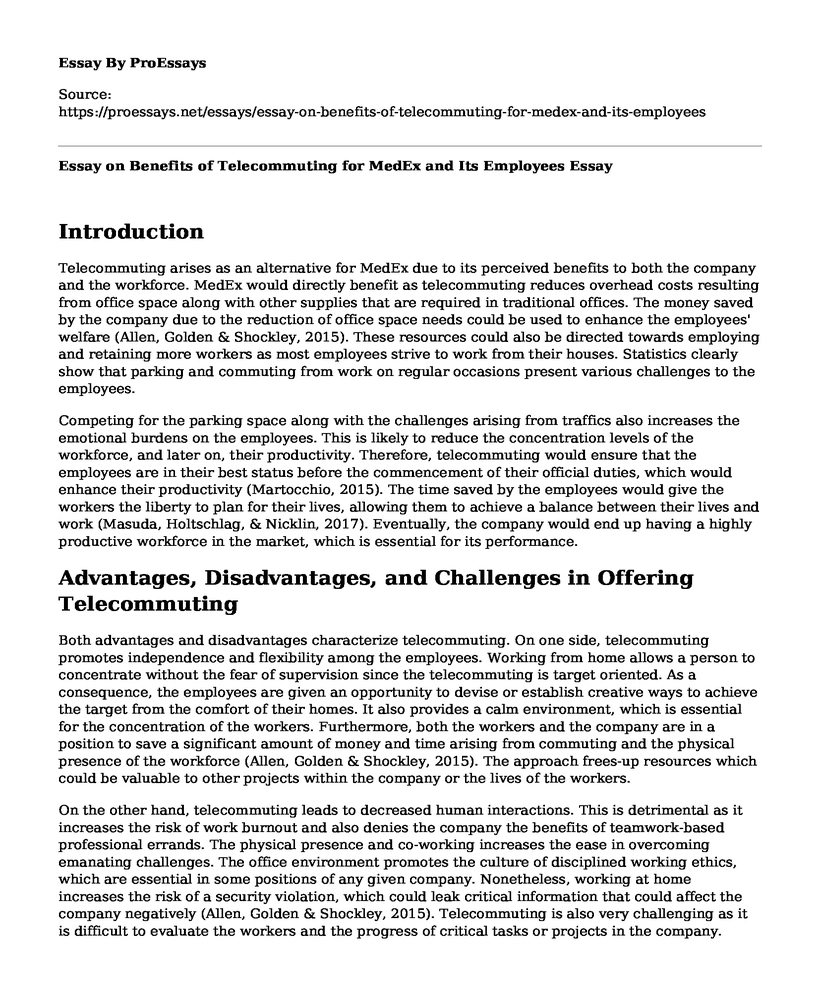Introduction
Telecommuting arises as an alternative for MedEx due to its perceived benefits to both the company and the workforce. MedEx would directly benefit as telecommuting reduces overhead costs resulting from office space along with other supplies that are required in traditional offices. The money saved by the company due to the reduction of office space needs could be used to enhance the employees' welfare (Allen, Golden & Shockley, 2015). These resources could also be directed towards employing and retaining more workers as most employees strive to work from their houses. Statistics clearly show that parking and commuting from work on regular occasions present various challenges to the employees.
Competing for the parking space along with the challenges arising from traffics also increases the emotional burdens on the employees. This is likely to reduce the concentration levels of the workforce, and later on, their productivity. Therefore, telecommuting would ensure that the employees are in their best status before the commencement of their official duties, which would enhance their productivity (Martocchio, 2015). The time saved by the employees would give the workers the liberty to plan for their lives, allowing them to achieve a balance between their lives and work (Masuda, Holtschlag, & Nicklin, 2017). Eventually, the company would end up having a highly productive workforce in the market, which is essential for its performance.
Advantages, Disadvantages, and Challenges in Offering Telecommuting
Both advantages and disadvantages characterize telecommuting. On one side, telecommuting promotes independence and flexibility among the employees. Working from home allows a person to concentrate without the fear of supervision since the telecommuting is target oriented. As a consequence, the employees are given an opportunity to devise or establish creative ways to achieve the target from the comfort of their homes. It also provides a calm environment, which is essential for the concentration of the workers. Furthermore, both the workers and the company are in a position to save a significant amount of money and time arising from commuting and the physical presence of the workforce (Allen, Golden & Shockley, 2015). The approach frees-up resources which could be valuable to other projects within the company or the lives of the workers.
On the other hand, telecommuting leads to decreased human interactions. This is detrimental as it increases the risk of work burnout and also denies the company the benefits of teamwork-based professional errands. The physical presence and co-working increases the ease in overcoming emanating challenges. The office environment promotes the culture of disciplined working ethics, which are essential in some positions of any given company. Nonetheless, working at home increases the risk of a security violation, which could leak critical information that could affect the company negatively (Allen, Golden & Shockley, 2015). Telecommuting is also very challenging as it is difficult to evaluate the workers and the progress of critical tasks or projects in the company.
Recommendations
Lastly, I would recommend telecommuting for MedEx as the benefits appear to outweigh the demerits. In the wake of the information age, people and companies are gradually focusing on technological solutions to reduce the cost of doing the business. Therefore, telecommuting should be considered as a technical solution to promote the MedEx performance and productivity, in a highly competitive market (Martocchio, 2015). However, telecommuting should be introduced in pilot programs to evaluate how MedEx could accommodate the challenges experienced before rolling out the entire program. Such factors also allow the company to evaluate the advantages and disadvantages of telecommuting in first-hand.
References
Allen, T. D., Golden, T. D., & Shockley, K. M. (2015). How effective is telecommuting? Assessing the status of our scientific findings. Psychological Science in the Public Interest, 16(2), 40-68.
Martocchio, J. J. (2015). Strategic compensation: A human resource management approach (8th ed.). Upper Saddle River, NJ: Pearson Education, Inc.
Masuda, A. D., Holtschlag, C., & Nicklin, J. M. (2017). Why the availability of telecommuting matters: The effects of telecommuting on engagement via goal pursuit. Career Development International, 22(2), 200-219.
Cite this page
Essay on Benefits of Telecommuting for MedEx and Its Employees. (2022, Jun 19). Retrieved from https://proessays.net/essays/essay-on-benefits-of-telecommuting-for-medex-and-its-employees
If you are the original author of this essay and no longer wish to have it published on the ProEssays website, please click below to request its removal:
- Managing a Global Supply Chain: Apple Inc - Essay Sample
- Essay on Making Smart Decisions: Critical Thinking, Creative Skills and Divergent Thinking
- Essay Sample on Social Security: The Foundation of Economic Security for Millions
- Essay on Managing Change Successfully: Implementing an Interprofessional Collaboration Project
- Essay Sample on Ethical Decision-Making: Principles and Process
- Essay Example on Leadership: Traits of Good & Bad Leaders Explored
- Strategic Leadership: A Necessary Core for Effective Growth - Research Paper Sample







